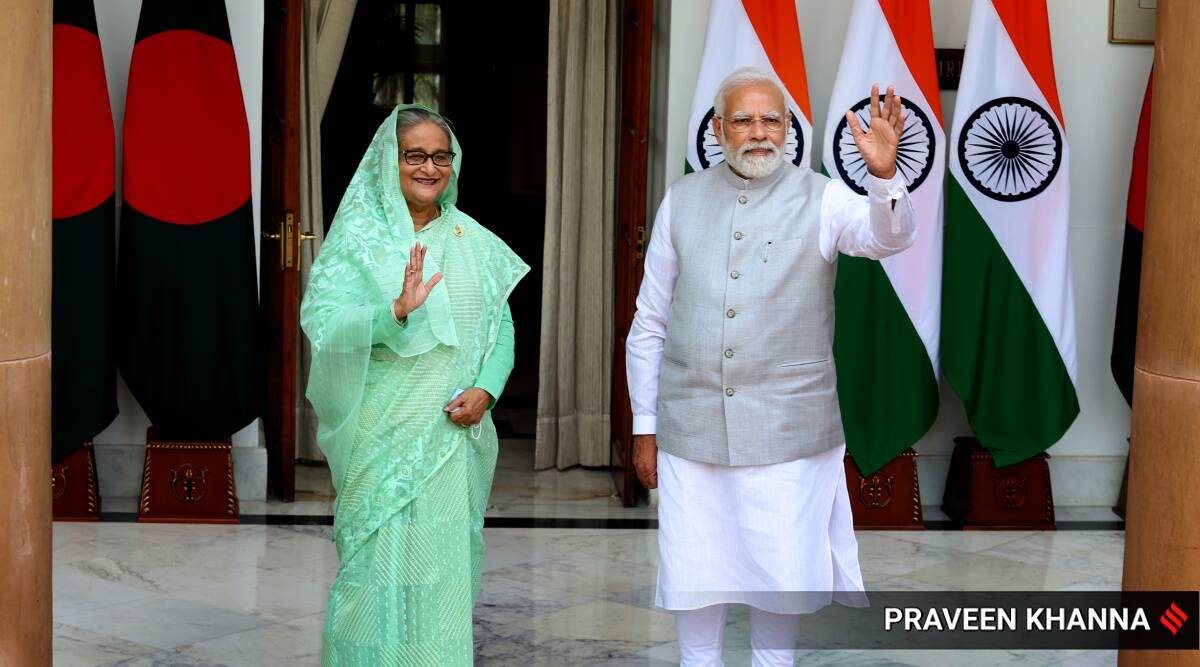 Prime Minister Narendra Modi along with Bangladesh Prime Minister Sheikh Hasina at Hyderabad house in New Delhi on Tuesday. (Express Photo/ Praveen Khanna)
Prime Minister Narendra Modi along with Bangladesh Prime Minister Sheikh Hasina at Hyderabad house in New Delhi on Tuesday. (Express Photo/ Praveen Khanna)Bangladesh Prime Minister Sheikh Hasina’s four-day visit to India, which began on September 5, was highly awaited in both countries. In Bangladesh especially, there was much speculation about the trip, as it was viewed as a means to take bilateral cooperation between the two neighbours to new heights — and also allow Bangladesh to navigate the economic challenges posed by the Russia-Ukraine war.
Bangladesh, so far, has calmly and conservatively navigated the macroeconomic uncertainties that stemmed from imploding import costs due to Covid-induced supply-chain disruptions and the rising energy costs after the Russia-Ukraine war started. This has meant that the Bangladesh government has already introduced difficult economic adjustments in the form of import restrictions and a sharp increase in fuel prices to pre-emptively deal with any adverse economic waves heading towards its shores. Of course, such pre-emptive prudent measures are very painful for ordinary citizens as they trigger high inflation and increase the cost of living.
Consequently, this trip was not only a means of taking stock of ongoing projects by inaugurating flagship initiatives like the 1320 MW Rampal power plant and the Rupsha railway bridge, which was inaugurated on September 6, but also find ways to navigate the rough economic waters that Bangladesh faces due to high energy costs in the global market. This bilateral visit was also critical for taking forward existing discussions and cooperation on issues such as energy trade, connectivity and developing key trade infrastructures between the two countries, especially in the border areas — and investments in human capital through training arrangements for the judiciary and technological cooperation between BCSIR and CSIR.
As of 2017, India has opened a $7.86 billion line of credit (LoC) with Bangladesh — this is supporting the execution of around 30 projects. However, so far, Delhi has disbursed only $1.5 billion of the standing commitment — accounting for less than 20 per cent of the pledged developmental credit. This underscores the need to revisit and renegotiate the LoC framework, so that both countries can expedite the economic investments under the arrangement.
Bangladesh and India are also expected to start negotiations on the bilateral Comprehensive Economic Partnership Agreement (CEPA), which is aimed at creating a supportive environment for preferential trade access and investment for both countries — especially after Bangladesh’s LDC graduation in 2026. An effective CEPA is likely to resolve issues and challenges associated with anti-dumping duties and rules of origin through multi-modal connectivity and deepening cooperation.
Perhaps the two key outcomes of interest that have surfaced are the Bangladesh and India interim water sharing agreement for the Kushiyara river, which is the first such pact between the two countries in over 25 years — after the Ganga water treaty in 1996. This is a noteworthy achievement and shows that more open-minded engagement will bear fruitful results for the pending Teesta Treaty, which has remained an elusive agreement for governments for more than a decade.
Second, India has already projected positive intent to export “surplus” fuel imported from Russia, which will help Bangladesh navigate the uncertain and volatile global oil market — even though the exact details of the economic arrangement are still unknown.
In recent times, there has been widespread speculation that extensive development cooperation between Bangladesh and China has tilted Dhaka towards Beijing. Yet, Sheikh Hasina pulled the curtain down on such speculation by boldly stating, “I reiterate that India is the most important and closest neighbour of Bangladesh. Bangladesh-India bilateral relations are known to be a role model for neighbourhood diplomacy.”
Moreover, this is consistent with the political mood in Dhaka, especially within its secular and liberal political fabric, which wants deeper trust and engagement between Dhaka and Delhi so that both countries can jointly neutralise any potential terrorist and security threats in the region — and also offer Bangladesh some hope to deal with the ongoing Rohingya crisis.
Bangladesh and India’s bilateral ties have rarely been, in history, a linear affair. After the brutal assassination of Bangladesh’s founding father and the first President Sheikh Mujibur Rahman on August 15, 1975, the political spectrum witnessed the rise of Islamic and military leaders who were hostile to any meaningful engagement with India between 1975 and 1996. This undermined Bangladesh’s capacity to structure any lasting cooperation with India. In fact, the relationship with India became deeply hostile when the BNP and Jamaat-e-Islami’s coalition government between 2001 and 2006 allowed Bangladesh’s sovereign territory to host armed insurgencies against the northeastern states of India by separatists.
This regrettable deterioration in the Bangladesh-India relationship was decisively reversed after the electoral victory of Prime Minister Sheikh Hasina and the Awami League in December 2008. And from then on, continued pragmatic engagement and political trust between Bangladesh and India have gone from strength to strength after Dhaka showed zero tolerance to all security threats to India.
Hope has been renewed after Prime Minister Hasina visit, especially because she and Prime Minister Narendra Modi stated that the spirit of friendship will help these two historic allies resolve all pending issues — and that the ongoing engagement between the two critical actors in South Asia will create conducive conditions for shared prosperity and peace in the region.
The writer is a Senior Economist at the Policy Research Institute of Bangladesh